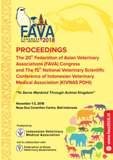AQ-12 Application of a Multiplex PCR Assay to Detect Campylobacter fetus subspecies venerealis from Imported Bovine Preputial Samples
Abstract
Campylobacteriosis, caused by Campylobacter spp., is of considerable economic importance to the cattle industry worldwide. Campylobacter spp. were recognized as etiological agents of abortion in sheep. Campylobacter fetus subsp. fetus (Cff) causes sporadic abortion in sheep, often late in gestation, while subspecies venerealis (Cfv) is a cause of sexually transmitted bovine infertility and sporadic abortion in cattle. Various investigations have been carried out in different countries to assess the prevalence and impact of this disease. Some published results surveys are outlined in Table 1.
Table 1. A summary of published data showing the prevalence of C. fetus in different countries
Study
area
Sample type(s)
Sample size
Prevale nce of
C. fetus (%)
Diagnostic method
Australia
(1985-1986)
Bulls (preputi al suction)
1 008
animals
41 herds
87% herds
positive
Serological
(Fluorescent
antibody test)
California
(United States of America)
Cows
400
47
Serological
(ELISA)
New Zealand
Cows (vaginal mucous) and bulls (preputial wash)
1 230 cows
(125 herds)
54 bulls
70% herds positive
Cfv : 0
Cff/others
Serological
(ELISA)
Bacteriological culture
Cff: Campylobacter fetus subsp. fetus, Cfv: C. fetus subsp. venerealis.
According to [1], Bovine Genital Campylobacteriosis (BGC) disease was classified as 1st Group of animal quarantine disease. It is an exotic disease that was not ever detected in Indonesia. However, large scale cattle importation to Indonesia from the countries which ever reported BGC prevalence in their territories, initiating and spreading BGC will be the major threat for feedlotter or dairy farm in Indonesia. Hence, we should apply diagnostic test to detect Cfv in order to prevent the introducing the BGC to Indonesia. The aim of this study was to verify that multiplex PCR assay applicative to detect Campylobacter fetus subsp. venerealis from field samples.

